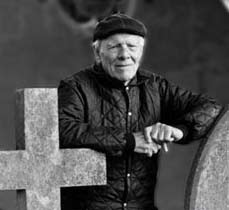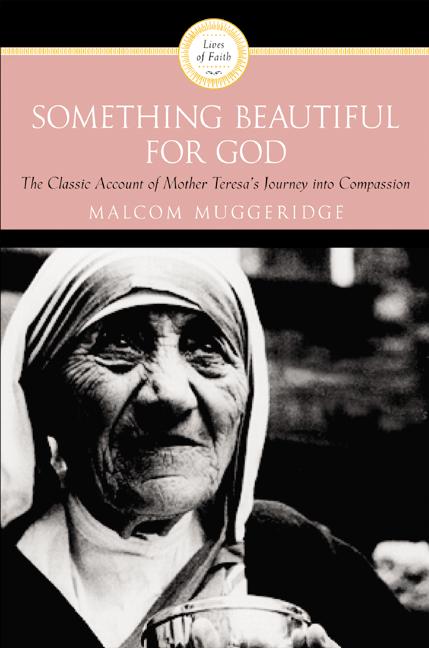Malcolm Muggeridge, who died, aged 82, in 1990, eight years after becoming a Catholic, was a great controversialist, consummate broadcaster and brilliant wordsmith. Like G.K.Chesterton, before him, he lived by his pen – both as a working journalist and as an author. But, with the advent of television Muggeridge became one of the first great masters of multi-media, immediately grasping the power of this new medium.
I met him in the 1980s and recall the story he told about his time he went to Biafra to cover the 1967-1970 War between Nigeria and Biafra, when as many and as 2 million people died. It was the first time war and its consequences was brought by TV into our living rooms. I can remember being deeply affected and, as a teenager organising an all-night sponsored walk around our school playing fields to raise cash for some of the victims whose haunting plight dominated each day’s news headlines.
When Muggeridge retold this story he reflected on one incident which had brought home to him how easily the media could itself become the message; that, in the rush for news footage, both journalist and viewer can become cynical and anaesthetised to the realities of what we are watching.
He said that at one location, where he was filming, some political prisoners were brought forward to be executed. The men were lined up and the firing squad made ready. As the Officer in charge ordered his men to take aim and fire, Muggeridge said that one of the cameramen called out for the execution to be temporarily halted. His battery was dead. The execution was delayed while a new battery was put in place. The Commanding Officer then resumed the execution.
Muggeridge astutely predicted that “some future generation will discuss as to wherein lay the greatest barbarism? On the part of the executioners? On the part of the viewers?” Some wise person might opt for the cameras.”
Muggeridge knew the power of the media for good or ill – and the temptation to manipulate it for your own ends.
Brought up as up as a Socialist – he was a Fabian devotee of the eugenicists, Sidney and Beatrice Webb. One Fabian Tract warned that in Great Britain “children are being freely born to the Irish Roman Catholics and the Polish, Russian and German Jews, the thriftless and irresponsible. . . . This can hardly result in anything but national deterioration or this country falling to the Irish and the Jews.”
Muggeridge eventually came to despise this racism and advocacy of eugenics, describing it as “pursuing truth through facts and arriving at fantasy, seeking deliverance through power and arriving at servitude.”
Like many of that generation he was initially captivated by Russian Communism but bravely renounced his political beliefs when he saw the enormity of Stalin’s crimes. Horrified by the gullibility of the western intelligentsia, the liberal elites, and how they had used their access to the newspapers to promote Communism, he wrote that “In the beginning was the Lie and the Lie was made news and dwelt among us, graceless and false.”
Needless-to-say, because of his apostasy Muggeridge made many enemies among his erstwhile fellow travellers. They derided him with the moniker “Saint Mugg” – knowing that he carried a lot of personal baggage – and ridiculing the gap between private failings and public utterances. Fortunately, for the rest of us, this didn’t shut him up, although he did tell me that he felt like one of “the walking wounded.”
He could easily have avoided issues like abortion – knowing he would fall foul of some holier-than-thou Inquisitor. Yet he courageously spoke out, arguing that it had only taken a generation for “a crime against humanity to be regarded as an act of medical compassion.” On another occasion he remarked that “our generation, needing a Saviour more, perhaps, than any that has ever existed, would be too humane to allow one to be born”; and he observed that “when a society doesn’t want children…then it’s on the downward path.”
In 1978 he also perceptively predicted that while those who had lived through the Nuremberg Trials were still alive it would halt what he said would become an irresistible pressure to legalise euthanasia. The Judges at the Trials had calculated that 275,000 people had been euthanized by the Nazis.
Muggeridge said that with the passage of time this would all be forgotten and that Governments would come to see the killing of the terminally ill, the sick, the senile, and disabled people, as a way of dealing with the costs involved of caring for them. Once again he concluded: “It takes just over thirty years in our humane society to transform a war crime into an act of compassion.”
He would, therefore, not have been surprised to hear Baroness Warnock’s contention that “If you’re demented, you’re wasting people’s lives – your family’s lives – and you’re wasting the resources of the National Health Service…Maybe it has to come down to saying: ‘Okay, they can stay alive but the family will have to pay for it.’ Otherwise it will be an awful drain on public resources.”
Nor would he have been surprised to have read the recent report in The Independent that, in India, some 12 million girls have been aborted simply because their parents wanted a boy. Worldwide The Economist estimates that 100 million girls have now been the victims of gendercide – a logical conclusion of the pro-choice farrago.
Muggeridge knew India well – he had taught there after leaving Cambridge. Much later, in 1969, he made the documentary that ultimately led him to become a Catholic. “Something Beautiful for God” was the story of Mother Teresa’s work in Calcutta and during the filming of which he believed a miracle occurred. He published a book by the same name and wrote:
“If the eugenicist’s wish were ever to be realized – the sick and the old, and the mad all who were infirm and less than complete and smooth-working, would be painlessly eliminated, leaving only the beauty queens and the athletes, the Mensa IQ’s, and the prize winners, to be our human family. That we should go on suffering would be, they would surmise, an outrage; and a deity that still allowed it to continue would be a monster… If this came to pass, along the ice-bound corridors of cash, God really would be dead.” Men he said would have no more status than machines.
Above all Muggeridge would not have been surprised to see the co-ordinated way in which the BBC and media have been manipulated to promote what he called “the great liberal death wish.”
Saint Mugg he may not have been but thank God for Malcolm Muggeridge, great Englishman, warts and all.

The Malcolm Muggeridge Society web site lists his publications and provides access to some of his recordings and broadcasts: http://www.malcolmmuggeridge.org/
House of Lords Debate on Media Freedom and Security worldwide 24th April 2025
Lord Alton's contribution to Short debate: Steps...

